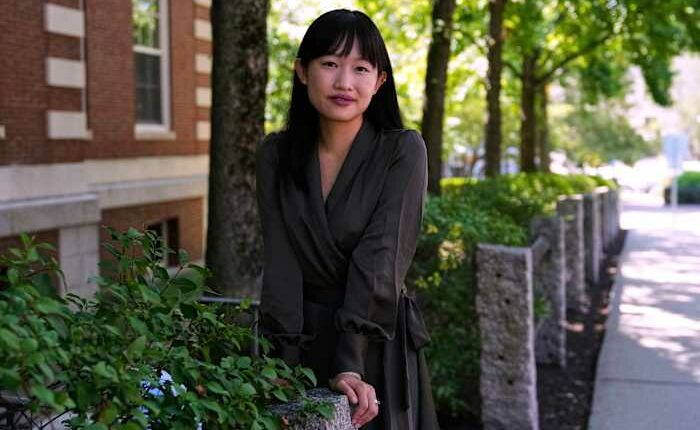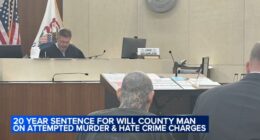Share this @internewscast.com

Rebecca F. Kuang, a literary marvel with six bestsellers under 30, finds an everlasting leisure-filled afterlife more unsettling than the thought of hell.
“As a youngster, I was taught that after death, you ascend to heaven, indulging in endless cake and companionship,” shared the 29-year-old novelist, known by her pen name R.F. Kuang, who grew up in a Christian household. “This concept was deeply disturbing because the idea of endless monotony frightened me. It seemed devoid of value since there would be no sense of time.”
The contemplation of life after death sparked Kuang’s newest work, “Katabasis.” Following the acclaimed satire in 2023’s “Yellowface,” she returns to fantasy.
Similar to her 2022 work, “Babel,” “Katabasis,” releasing Tuesday, humorously yet darkly explores academia—a realm familiar to the current Yale graduate student. Already buzzing on BookTok and top book lists, the story is set to become an Amazon series with “The Walking Dead” showrunner Angela Kang, where Kuang will be a producer.
Kuang, though, tries not to let pressure and high expectations get to her.
“I naturally feel a bit anxious with a book release, but I try not to linger on it as it’s not productive,” said Kuang, who had parts of “Katabasis” penned before the release of “Yellowface.”
The book follows Cambridge doctoral student Alice, desperate for a recommendation from the department chair. When he dies, Alice uses a pentagram to chase him into purgatory, a path only few academics survive. Her classmate and rival, Peter, insists on joining her.
Like the nine circles of hell from “Dante’s Inferno,” readers get swept up in the “Eight Courts of Hell.” As the architect of hell, Kuang lays the landscape out in great detail, from vast dunes to skeletal animals made only of bones held together with chalk.
Kuang researched different beliefs about the underworld and wrote “Katabasis” all while continuing pursuit of her doctorate in East Asian languages and literature at Yale. She spoke with The Associated Press recently about the “magick” of designing her own version of hell and the Trump administration’s targeting of universities, among other topics. The interview has been edited for clarity and brevity.
AP: You must have had a lot of fun like designing each hell court. The Pride Court (a library) was a lot of people who had been very condescending or pretentious. Was that your own playful revenge for maybe sometimes annoying — be it well-intentioned — colleagues in academia?
KUANG: For sure, I — we had a lot of fun. I was bouncing ideas off my husband because he’s in academia as well. We were thinking about, “Oh, what are all the little annoying things that people do that couldn’t be properly called malicious but I think deserves a little bit of punishment in hell?”
AP: What made you settle on the time period of the 1980s?
KUANG: I just think the ’80s are very culturally fun for me. I’m a ’90s kid, so I just miss that. But I am also interested in the Reagan and Thatcher era. So I think the ’70s and ’80s are this period of backlash and the rise of neoliberalism and privatization against the sort of cultural advances that had been made during the ’60s. So in the ’60s, you have the civil rights era and then the ’70s and ’80s, you have the rolling back of a lot of those egalitarian movements.
I wanted my characters to be working in a space where it feels like there’s this widespread denial about the existence of structural oppression — and they are really raised by this mentality that if things go wrong for them then it’s entirely their fault and they need to pull themselves up by their bootstraps, which is devastating because then they don’t have avenues for solidarity.
AP: I have to ask you about a line from the book: “On both sides of the Atlantic, the conservatives were several years in power and this meant funding cuts for universities, shrinking departments, vanishing opportunities.” Total coincidence?
KUANG: Yes, but I finished I finished revisions before the election. So, I think even in November, we had no idea what kind of attacks on higher education were going to come on in the following fall. So I wasn’t writing about this political moment, but it does seem like we’re right back in the ’80s.
AP: You’re very much steeped in that academic world right now. How are you processing this political moment?
KUANG: All I can do is just keep doing my work. Because I think the final victory would just be to roll over and play dead and let the administration stop us from pursuing the lines of research that we’ve been pursuing all along. And they can make it as difficult as they can, but we shouldn’t preemptively just put our pens down and walk away.
AP: You don’t really look at people’s BookTok videos either praising you or reviewing your book?
KUANG: The last time I was on TikTok was two years ago, and it was fun but it’s a massive distraction. I believe pretty firmly that TikTok should be a space for readers. It’s actually this wonderful thing that, like especially younger readers, can get so enthusiastic about books and share their opinions and recommend things like that. That’s really, really cool, especially at a time where things like reading is kind of under attack especially with book bans and all that.
Copyright 2025 The Associated Press. All rights reserved. This material may not be published, broadcast, rewritten or redistributed without permission.













